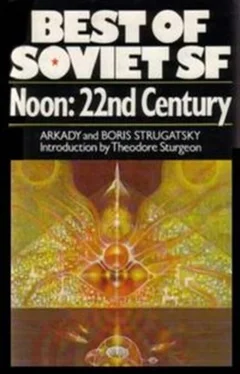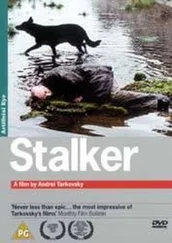“It’s not a call sign—it’s gibberish.”
“It’s still a call sign,” the assistant said quietly. “All the same, it’s on a fixed frequency.”
“‘Frequency, frequency,’” the controller said through his teeth.
The assistant bent toward the screen, peering myopically at the figures on the coordinate grid. Then he looked at the clock and said, “He’s passing Station Gamma now. Let’s see who it is.”
The controller laughed gloomily. What else can I do? he thought. I think we’ve done everything we can. All flights have been stopped. All touchdowns have been forbidden. All near-Earth stations have been alerted. Turnen is getting the emergency robots ready.
The controller fumbled at the microphone on his chest and said, “Turnen, what’s happening with the robots?”
Turnen answered unhurriedly: “I’m planning on launching the robots in five or six minutes. After they’re launched, I’ll tell you more.”
“Turnen,” said the controller, “I’m begging you, don’t dawdle—hurry it up a little.”
“I never dawdle,” Turnen answered with dignity. “But it’s senseless to hurry when you don’t have to. I will not delay takeoff by one extra second.”
“Please, Turnen,” said the controller, “please.”
“Station Gamma,” said the assistant. “I’m giving maximum magnification.”
The screen blinked, and the coordinate grid disappeared. In the black emptiness appeared a strange construction like a distorted garden summerhouse with absurdly massive columns. The controller gave a drawn-out whistle and jumped up. This was the last thing he had expected. “A nuclear rocket!” he shouted in astonishment. “How? From where?”
“Ye-es,” the assistant said indecisively. “Really… can’t understand it…”
The incredible structure, with its five fat pillarlike tubes sticking out from under a dome, was slowly turning. A violet radiance trembled under the dome—the pillars looked black against its background. The controller slowly lowered himself down onto the arm of the chair. Of course—it was a nuclear rocket, an interplanetary ship. Photon drive, two-layer parabolic reflector of mesomatter, hydrogen engines. A century and a half ago there had been many such ships. They had been built for the conquest of the planets. Solid, leisurely machines with a fivefold safety margin. They had served long and well, but the last of them had been scrapped long ago—long, long ago.
“Really…” muttered the assistant. “Amazing! Where have I seen something like that?… Greenhouses!” he shouted.
From left to right, a wide gray shadow quickly crossed the screen. “Greenhouses,” the assistant whispered.
The controller narrowed his eyes. A thousand metric tons, he thought. A thousand tons and speed like that… To bits… to dust… the robots! Where the hell are the robots?
The assistant said hoarsely, “He got through… Can it really be? He got through!”
The controller opened his eyes wide again. “Where are the robots?” he yelled.
A green light flared up on the selector board by the wall, and a calm male voice said, “This is D-P. Slavin calling Main Control. Request permission for touchdown at Base Pi-X Seventeen.”
The controller, flushing red, started to open his mouth, but did not make it. Several voices at once thundered through the hall:
“Go back!”
“D-P, permission denied.”
“Captain Slavin, go back!”
“Captain Slavin, this is Main Control. Immediately assume any orbit in Zone Four. Do not touch down. Do not approach. Wait.”
“Roger, wilco,” Slavin responded in confusion. “Enter Zone Four and wait.”
The controller, suddenly remembering, closed his mouth. He could hear a woman’s voice at the selector board, arguing with someone, “Explain to him what’s going on. Explain it, for pity’s sake.” Then the green light on the selector board went out again, and all the noise ceased.
The display on the screen faded. Once again the coordinate grid appeared, and once again a bright glimmering spark crawled within the depths of the screen.
Turnen’s voice rang out: “Emergency officer to control. The robots have launched.”
At the same second, in the lower right corner of the screen appeared two more bright points. The controller rubbed his hands nervously, as though he felt chilly. “Thank you, Turnen,” he muttered. “Thank you very much.”
The two bright dots—the emergency robots—crawled across the screen. The distance between them and the nuclear craft gradually decreased.
The controller looked at the glimmering point crawling between the precise lines, and thought that the old-timer was just entering Zone Two, which was thick with orbital hangars and fueling stations; that his daughter worked on one of those stations; that the mirror of the Orbiting Observatory’s Big Reflector had been smashed; that the ship moved as if blind, and it either did not hear signals or did not understand them; that every second it risked destruction by plowing into any of the numerous heavy structures or by ending up in the launching zone of the D-ships. He thought that it would be very hard to stop the blind and senseless motion of the ship, because it kept changing velocity in a wild and disorderly fashion; and that the robots could end up ramming through it, even though Turnen must be directing them himself.
“Station Delta,” said the assistant. “Maximum magnification.”
On the black screen, once again the image of the ungainly hulk appeared. The flashes of plasma under the dome grew uneven, arhythmical, and it seemed as if the monster were advancing convulsively on fat black legs. The dim outlines of the emergency robots appeared alongside. The robots approached carefully, springing back at every jerk of the nuclear rocket.
The controller and his assistant were all eyes. Stretching his neck as far as it would go, the controller whispered, “Come on, Turnen… Come on… come on, old buddy… Come on.”
The robots moved quickly and surely. From both sides, titanic tentacles stretched out toward the nuclear rocket and seized hold of the widely spaced pillar-tubes. One of the tentacles missed, ended up under the dome, and vanished into dust beneath the force of the plasma. (“Ouch!” the assistant said in a whisper.) A third robot dropped down from somewhere above, and latched onto the dome with magnetic suckers. The nuclear rocket moved slowly downward. The flickering radiance below its dome went out.
“Ooh!” the controller muttered, and wiped his face with his sleeve.
The assistant laughed nervously. “Like giant squids and a whale,” he said. “Where does it go now?”
The controller inquired into his microphone, “Turnen, where are you taking it?”
“To our rocket field,” Turnen said unhurriedly. He was gasping slightly.
The controller suddenly imagined Turnen’s round face, shiny with sweat, lit up by the screen. “Thank you, Turnen,” he said with feeling. He turned to the assistant. “Give the all-clear. Correct the schedule and have them get back to work.”
“And what are you going to do?” the assistant asked plaintively.
“I’m going to fly there.”
The assistant also wanted to be there, but he only said, “I wonder whether the Cosmonautical Museum is missing any ships.” The matter was coming to a more or less happy ending, and he was now in a fairly good mood. “What a watch!” he said. “All day I’ve been quaking in my boots.”
The controller clicked a few keys, and a rolling plain appeared on the screen. The wind drove broken white clouds about the sky, and it formed ripples on dark puddles between the sparsely vegetated hummocks. Ducks splashed about in a large pond. Spaceships haven’t taken off from there in a long time, thought the assistant.
Читать дальше












